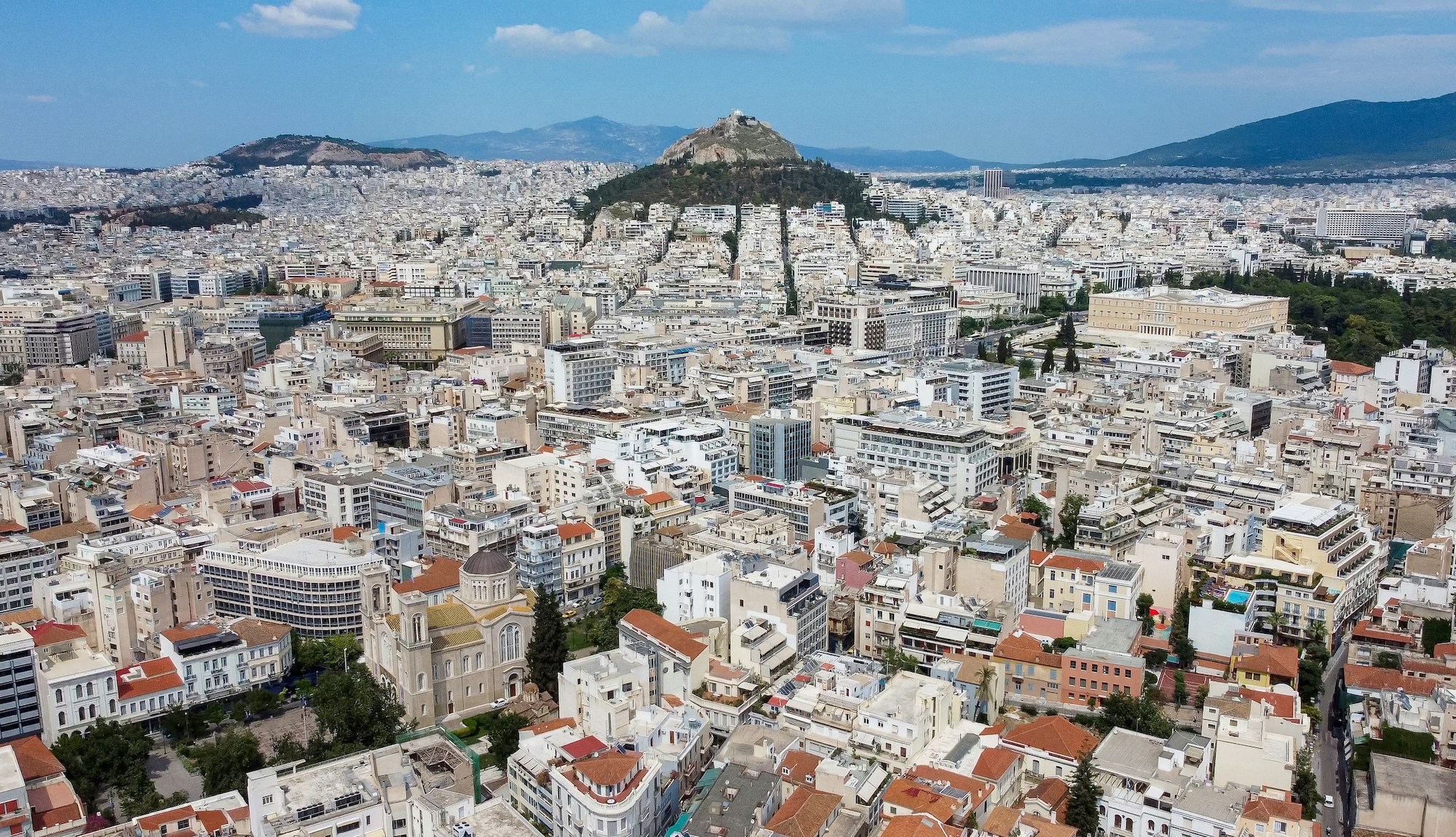In early 2024 we shared our top travel trends for the year ahead, and one of the most talked about trends right now is the use of AI to plan holidays. But is planning a holiday using AI really reliable? Katie Silcox put her faith in one AI tool – ChatGPT – to plan a weekend break in Athens, Greece. Here’s what she found.
As I’m shown to my room at Hotel Grand Bretagne in Athens, Greece, I realise that I need to make changes to my weekend plans.
I’ve arrived with a three-day, ChatGPT-generated itinerary in hand but – as he throws open the balcony doors in my room – my hotel butler tells me that “this is one of the best spots in the city to watch Sunday’s Changing of the Guards parade.” The parade takes place every Sunday at 11AM and the view from my room overlooks every inch of the guards’ march.
My current, ChatGPT-devised itinerary tells me I should be at Cape Sounion on Sunday at 11AM – some 40 miles away from the hotel. I quickly realise that my butler is right and that I need to make changes.
It’s been quite the digital journey to even get here: I’d decided to put my faith in artificial intelligence and plan a weekend break using only AI as a guide. At this moment, standing on my hotel balcony, I’m unsure why I thought this might be a good idea.
When it comes to travel planning, I know what I like: good food, a nice hotel, authentic experiences and some time without any plans at all. I also know what I don’t like: shops or restaurants aimed solely at tourists, tight schedules and sticking to only well-known attractions. I can’t help but wonder if I’d be better off asking people who know me, or who will take the time to learn about my likes and dislikes – such as friends, family or a travel planner – for recommendations instead.
Putting the entirety of my plans into the hands of AI was daunting. Not only did I not really know how to start or what to ask, the results I would receive were – according to a ChatGPT FAQ page – an amalgamation of:
1) information that is publicly available on the internet
2) information that is licensed from third parties
3) information that users or human trainers provide
Essentially, a list of resources and people who don’t know me at all.
I began my quest by trying to find accommodation, asking ChatGPT: “Where is the best place to stay in Athens, Greece?” The answer I received back was a list of neighbourhoods. Not quite what I was hoping for, but I accept this is my fault. I wasn’t clear enough about what I was looking for.
Lesson number one: be specific in what you ask for.
Rewording my question, I tried again: “Which is the best hotel in Athens, Greece?” I’m given a list of five hotels. An answer more helpful than the first, yet still no specific clarity and instead something I could have googled with ease. I try again: “Which is the one best hotel in Athens, Greece?” “Hotel Grande Bretagne, a Luxury Collection Hotel,” ChatGPT returns. We’re getting somewhere.
Athens is a city I know well so I was savvy as to whether the answers I was given really did reflect reality. In this case, ChatGPT was spot on. Hotel Grande Bretagne has been considered one of the best hotels in Athens for many years; it opened in 1874 (so is celebrating its 150th anniversary in 2024) and over the years has been the go-to hotel for movie stars, politicians and royalty, including Elizabeth Taylor, Sophia Loren, Winston Churchill and Princess Grace of Monaco (also known as Grace Kelly). In fact, fast forward a few weeks to when I checked in, and I shared the hotel with the South Korean Prime Minister, Han Duck-soo.
With my hotel decided, I needed an itinerary.
Without going into detail about each and every question asked and answer received (there was a lot of back and forth between me and ChatGPT in this journey), it was a similar story as I tried to drill down into an itinerary for the three days. Each question I asked, such as “can you give me a three-day itinerary for Athens?” resulted in answers that hit the main spots – the Acropolis, some museums, lunch at a Greek taverna, the beach – but that were vague when it came to nuances, like which Greek taverna serves the tastiest food or has the best atmosphere.
There was also no connection to the fact I’d decided to stay at Hotel Grande Bretagne, so the itinerary each day began and ended at different locations. But, I had to ask myself, how could machine-learnt data know everything a human thinks? I hadn’t thought to confirm my hotel decision with it, like I might have in a more natural conversation with friends or a travel planner.
Lesson number two: tell your AI tool as many details as you can before it starts to plan.
“Can you build me a three-day itinerary starting and ending each day at Hotel Grande Bretagne?” I continue. “Of course,” it replied, mimicking friendly conversation before repeating its initial suggestions with a few added breakfasts and dinners at the hotel. I feel myself getting frustrated. The recommendations are fine, but no more than that. There’s no detail, no nuance, nothing that I couldn’t have googled or asked a friend. Or a hotel butler.
One suggestion, for example, is to “eat lunch at a trendy café in Kolonaki.” Wanting more detail, I ask “which is a trendy café in Kolonaki?” and am told to visit Little Kook. As mentioned – and unfortunately for ChatGPT – I know Athens, and Little Kook is neither in Kolonaki nor a trendy café; it’s far more of a tourist hotspot built for Instagram.
Lesson number three: don’t believe every answer you receive.
I try again to find a taverna for lunch: “Which is the best traditional Greek taverna in Plaka?” I’m given five answers: a pattern repeated from my initial hotel suggestions. “Can you give me one?” I ask. “As of my last knowledge update in January 2022, one well-regarded traditional Greek taverna in Plaka was Taverna Diporto,” it tells me. Wrong again, ChatGPT. Taverna Diporto is not in Plaka.
Our conversation goes on like this until eventually, after repeating each question (multiple times) and asking it to narrow down the suggestions (also multiple times), I have an itinerary. Even if it is, in parts, based on two-year-old sources.
Lesson number four: suggestions might be dated.
For the most part, I followed ChatGPT’s suggestions during my weekend in the centre of Athens – I dined on a wonderful breakfast of eggs Benedict, green juice and plenty of good coffee at Hotel Grand Bretagne, with views across to the Acropolis; I ate lunch at Taverna Diporto (even though it’s not in Plaka) before strolling towards Plaka to take in an area ChatGPT describes as having a “charming atmosphere” (it does); I visited the Ancient Agora and Temple of Hephaestus; I wandered around the Acropolis; and I spent time in the equally-fascinating Acropolis museum.
But what I didn’t do is equally significant. I didn’t visit Kolonaki (or Little Kook), nor catch a “traditional Greek music performance,” (despite my drilling down on this particular ChatGPT suggestion, I was never actually told where to find it); and I didn’t visit the coast as suggested for the Sunday – instead taking my hotel butler’s suggestion and staying in my room for a birds’ eye view of the Changing of the Guards ceremony. In fact, I spent most of Sunday at the hotel; it was an unseasonably warm day and the hotel’s rooftop pool was too inviting not to spend a few hours lapping up the sun, fresh mocktail in hand.
Lesson number five: ChatGPT can’t account for the weather.
Neither can humans, for the most part, but it does mean you should be prepared to chop and change your itinerary accordingly. Perhaps you’ll want to spend more time in the sun (like me on that lazy Sunday), or perhaps AI will send you to an outdoor attraction during a rainstorm.
Lastly on my AI trip planning journey, I asked for some tips for visiting Athens and was presented with a list that might apply anywhere: stay hydrated, wear comfortable footwear and sun protection, try local food, respect cultural norms. These are perhaps indicative of my overall experience using ChatGPT to plan a holiday: useful information to a point, but somewhat generic.
Lesson number six: use AI to find out generic information but not for specifics.
To recap the lessons I learnt when planning a holiday using AI:
- Be specific in what you ask for
- Tell your AI tool as many details as you can before it starts to plan
- Don’t believe every answer you receive
- Suggestions might be dated
- AI can’t account for the weather (but then, neither can humans for the most part). Be prepared to chop and change your itinerary accordingly
- Use AI for generic (and somewhat useful!) information, but not for specifics
Would I use the tool to plan another trip? As of today, it’s unlikely. My ChatGPT-generated itinerary was a good starting point, but needed additional research on my part, and more than a few added suggestions from non-machine sources.
Yes, it could go into some detail – but it made me work for the detail and, honestly, it became tedious. I’m certain a Google search, other online research, or the help of a travel planner would have quickly given me more relevant information. It also had some good suggestions (once I’d worked hard to get them), but these came alongside others that were either inaccurate, or were based on dated information.
The biggest flaw though, was the lack of attention to the unique details of my trip, instead relying on generic information. This meant I almost lost out on a once-in-a-lifetime Sunday morning experience. Saved only by the human touch of a hotel butler.
As Hope Dowlen, co-founder at private travel concierge company 48 London tells me, “the reason our members like to use us is because they have to make minimal effort, they know that we get the job done, and that we know them inside out – so there won’t be any disappointments or surprises.” Reflecting on my planning journey: the many (many!) questions I had to ask to get recommendations tailored to me, alongside the end result not being quite right – I have to agree with Hope, for now.
Yet, after a post-experiment conversation with a friend, someone far more knowledgeable about AI than I am, I have to accept some responsibility for the lack of relevant answers I received. She tells me – in no uncertain terms – that I “didn’t use AI properly” and that I should have given it far more information about myself to get the answers I wanted: my age, my job, previous hotels I’ve enjoyed, and more.
I don’t disagree, but I also think the way I’ve navigated it is the way an average user would. I am an average user, after all. Two of the lessons I learned were to ‘be specific in what you ask for’ and ‘tell AI as many details as you can before you start’. I thought I had done this, but it appears I could have done more.
In 2024, artificial intelligence is still in its infancy (as is my knowledge of how to use it) so, perhaps, as both technology and our understanding of it develop, becoming ever-more sophisticated, there will be enough two-way knowledge and trust to allow for planning a holiday using only AI. I look forward to trying again soon, once we both know better. Watch this space.
We may earn a commission if you buy something from any affiliate links on our site.


























Any Questions or Tips to add?